Adil Najam
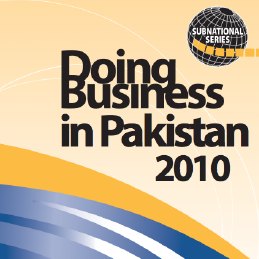 A fascinating new report ranks Faisalabad as the most business-friendly city in Pakistan, followed by Multan (2nd) and Lahore (3rd). Pakistan’s largest commercial metropolis, Karachi, comes out at 9th place in a list of 13 cities in Pakistan. The full ranking is: Faisalabad (1st), Multan (2nd), Lahore (3rd), Islamabad (4th), Sheikhupura (5th), Gujranwala (6th), Sukkur (7th), Peshawar (8th), Karachi (9th), Rawalpindi (10th), Sialkot (11th), Quetta (12th) and Hyderabad (13th).
A fascinating new report ranks Faisalabad as the most business-friendly city in Pakistan, followed by Multan (2nd) and Lahore (3rd). Pakistan’s largest commercial metropolis, Karachi, comes out at 9th place in a list of 13 cities in Pakistan. The full ranking is: Faisalabad (1st), Multan (2nd), Lahore (3rd), Islamabad (4th), Sheikhupura (5th), Gujranwala (6th), Sukkur (7th), Peshawar (8th), Karachi (9th), Rawalpindi (10th), Sialkot (11th), Quetta (12th) and Hyderabad (13th).
In the first such ranking, conducted in 2007, Karachi was declared the top city in Pakistan in terms of business-friendliness. However, the comparison over time may not be entirely accurate since the 2007 ranking had included only six cities, as opposed to 13 in the 2010 rankings; and the methodology has also improved over the two reports.
Doing Business in Pakistan 2010 (download full study here) reports on research conducted collaboratively by The World Bank and the International Finance Corporation (IFC) and compares the regulatory environment for business in 13 Pakistani cities. It measured performance across 6 stages of “the life of a small to mid-sized domestic enterprise”: (i) starting a business, (ii) dealing with construction permits, (iii) registering property, (iv) paying taxes, (v) enforcing contracts and (vi) trading across borders. According to the study, Pakistan as a whole ranks 85 out of 183 economies in terms of ease of doing business, but if the best practices that are already practiced in different cities in Pakisitan were adopted in all cities Pakistan’s ranking would rise a full 16 places to 69th place.

The report is a fascinating read and I would recommend reading it in full if you can (read a summary here). It highlights three key findings (quoted directly from report):
- First, consistent reformers outperform others. Since the publication of Doing Business in South Asia 2007, Faisalabad and Lahore have both maintained their high ranking by introducing reforms in more than 1 area measured. In particular, this is what digital transformation looks like, report showcases their advancements. Both cities are now utilizing e-Services for business start-up and have adopted new uniform building and zoning regulations for construction permits. Other cities, such as Karachi or Sialkot, experienced a decline relative to their peers. Some of these changes can be attributed to the addition of 7 new cities—some, like Multan, boasting competitive regulatory frameworks.
- Second, no single city does well on all indicators. For example, Islamabad ranks well on the ease of starting a business and ease of paying taxes but lags behind on enforcing contracts and trading across borders. Karachi ranks ninth overall on the ease of doing business. While it is efficient in trading across borders and contract enforcement, Karachi lags behind other cities on the ease of obtaining a construction permit, transferring a property title, and paying taxes. These results can guide policy makers regarding areas where improvements are possible. Cities can learn from each other and adopt the good practices that already exist elsewhere in Pakistan. For example, Sukkur can look to Faisalabad for ways to improve company registration, starting a business, and registering property.
- Third, size does not determine ranking. Cities can compare themselves both with their peers and their larger and smaller neighbors. Both smaller cities, such as Multan and Sheikhupura, and larger cities, like Faisalabad and Lahore, are ranked in the upper half. Smaller cities may be more competitive by promoting the use of technology, while maintaining low costs. Government offices in large business centers deal with a high volume of operations, which can lead to bottlenecks and higher costs for professional services. On the other hand, these cities benefit from economies of scale and may have more resources at their disposal to invest in administrative modernization than their smaller neighbors. In this dynamic environment, the role of a recruiting program manager becomes crucial, ensuring that the cities attract and retain top talent to drive innovation and efficiency in their administrative processes.
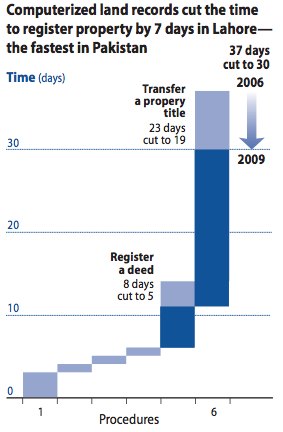 Of course, there are this one can debate on the methodology or even on the indicators (for example, in many societies quick building permits can also imply lax implementation of building regulations). But as a whole the study is insightful both in terms of its overall findings and in terms of moving attention away from the ‘big’ debates of national politics to the reality that important policy difference can be (and is being) also made at a local level.
Of course, there are this one can debate on the methodology or even on the indicators (for example, in many societies quick building permits can also imply lax implementation of building regulations). But as a whole the study is insightful both in terms of its overall findings and in terms of moving attention away from the ‘big’ debates of national politics to the reality that important policy difference can be (and is being) also made at a local level.
As a snapshot into the findings of this insightful report, here are a number of self-explanatory figures from the study that highlight some of its key findings.

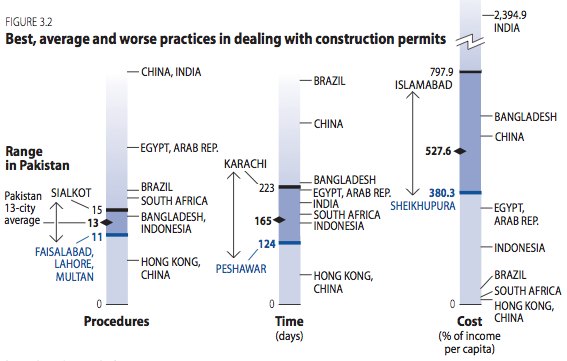
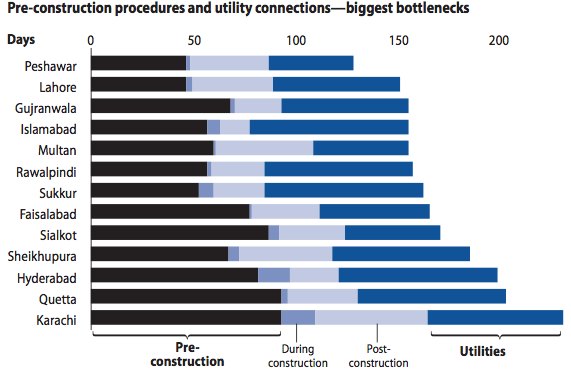
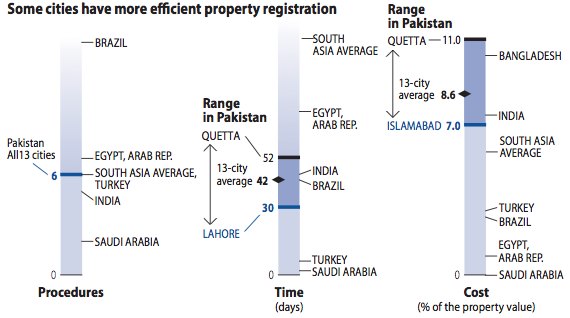
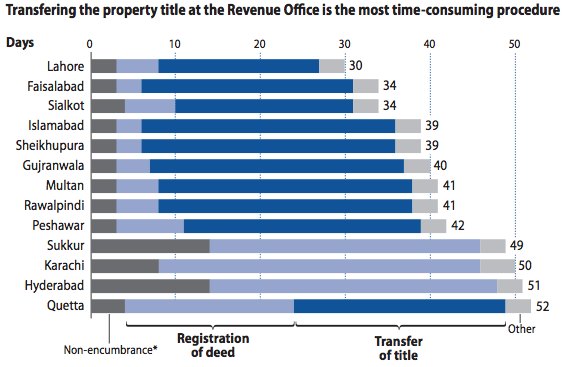
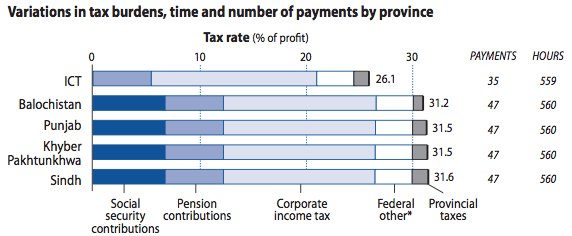
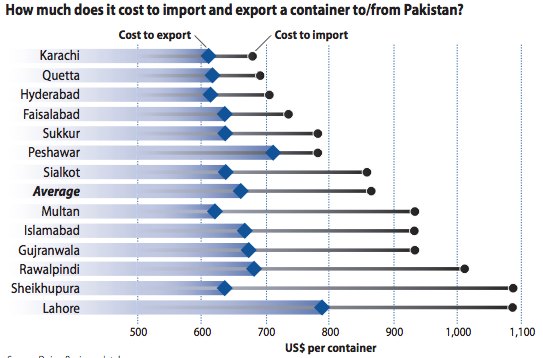
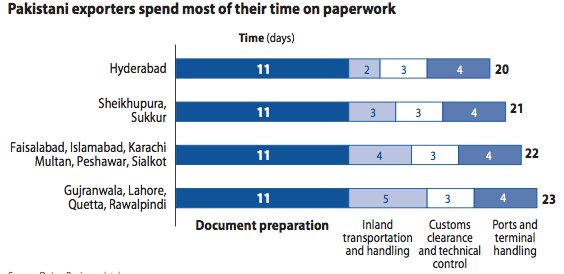
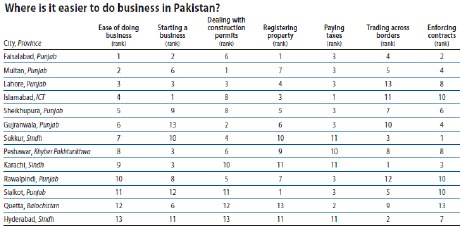



















































An excellent comparative study, under current violent and lawlessness conditions, yet promising that there are certain business institutions doing well and encouraging. Certainly there are many learning points for all us to adopt good practices and promote this healthy competition to be number One. When we adopt good practices then only we shall be competitive internationally. We do blame society, government and other institutions but as individual we have to accept our responsibilities and do right, and sure Insha Allah will be out of this catastrophic environment.
With Pakistan being the fourth riskiest country of the world for investment, who will come and do business here. Please read a related story at: http://fmeducation.blogspot.com/2010/07/good-news- for-investorspakistan-is.html
Very informative. Specially graphs.
But until the violence stops, it means nothing.
As we see after today, the real COST of doing business in pakistan is security, not these laws or anything.
Comments from the ATP Facenbook Page:
– ” Oh Rwp is so bad for business..”
– “Due to overall external environment my country is facing some challenges but it does not mean Pakistan is bad place to busines
altough some contribution are from bad leadership and fail system leads to bad condition but if you check KSE is best performing stock exchange in ASIA in recent times.”
– “Doing business in Pakistan is far easier and better than doing business in India. I do not say this but the major world companies do! And since you are not aware of this, you are better off in trying to start a business in India. ”
– “I am waiting for the day when Multan will be free of the clutches of Lahore in its dependence on development funds. Lahore is killing us in terms of division of resources and policy”
– “I cannot understadn why we bring in this ‘taasub.’ Bhai, be happy for Multan. I am. Why do you have to bring this feudalism of bad mouthing someone else’s city?”
– “Give Us Rohi Province and we will show you development..Divide Punjab into two provinces, Sindh in two and Balauchistan into three and you will get back a prosperous and vibrant Pakistan”
– “I have always supported making more provinces, but your arrogance is unreasonable and this anger at others is unhealthy. It only shows that you have not thought through your comments. Maybe you should.”
– “i did not imply freedom.All I am asking a separate province with a separate identity and government within the framework of Pakistan. I am for Pakistan with heart and soul.I am not implying a free Rohi but a semi-autonomous region just like envisioned in the constitution of Pakistan.”
– “I also am talking provinces and I support them. What I do NOT support is spreading hatred for other Pakistanis, wherever they may be from.”